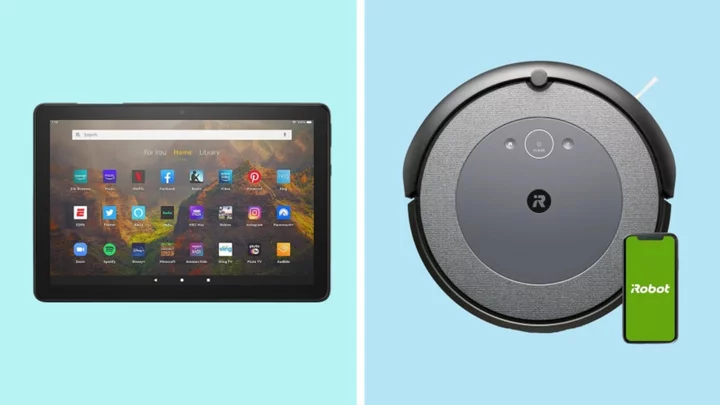
These Are the 20 Tallest Skylines on Earth
From Dubai to New York City, these cities boast the world's tallest skyscrapers.
2023-09-26 20:18

10 Wonderfully Weird Muppet Duets
The Muppets have squared off against everyone from Johnny Cash to Celine Dion.
2023-09-26 04:27

News channel says Iranian official attacked its journalist in New York
A journalist was attacked on Wednesday evening in New York City by an official who was part of Iranian President Ebrahim Raisi's camp, a news channel has alleged.
2023-09-23 10:51

Amazon’s October Prime Day Is Coming Back—and Here Are All the Best Deals You Can Already Shop
Amazon’s October Prime Day is coming back. Find out everything you need to know about it, plus shop early deals on Apple, iRobot, and more.
2023-09-23 04:25

18 Surprising Facts About ‘Halloween III: Season of the Witch’
The controversial sci-fi horror film wasn’t a hit with critics or fans in 1982, but “Halloween III: Season of the Witch” has morphed into a cult classic over the years.
2023-09-20 00:26

Germany bans neo-Nazi group Hammerskins
German authorities crack down on the skinhead group known for organising far-right concerts.
2023-09-19 18:24

20 Spectacular Movie Musicals From the Last 50 Years
The last half-century or so has given us some of the best musical movies of all time.
2023-09-17 00:15

7 ways you could be damaging your eye health without even realising
Our eyesight is often something we take for granted – until there’s something wrong with it. Problems like short-sightedness (myopia) are rapidly increasing. In fact, research has predicted that by 2050 there will be 4,758 million people with the condition – nearly half (49.8%) of the world’s population – as experts are highlighting ahead of National Eye Health Week (September 18-24) In addition, new research by Macushield found 73% of Brits notice their eyes deteriorating with age, and the World Health Organisation’s (WHO) World Report on Vision has predicted a dramatic increase in the need for eyecare in the near future, pointing out that at least 2.2 billion people globally have a vision impairment – and around half of these have vision impairment that could have been prevented. “Some people may not be giving their eye health the attention it deserves, occasionally missing out on annual eye tests, which play a crucial role in detecting conditions like cataracts, glaucoma, and age-related macular degeneration,” says ophthalmologist Dr Jørn Slot Jørgensen. “When identified and addressed in a timely manner, these issues can be managed effectively, helping safeguard our vision.” Jørgensen says the pandemic also played a role in worsening eye problems, particularly the increase in short-sightedness. “With the shift to remote work, people are now more likely to spend extended hours with their screens for work and leisure,” he says. “Prioritising eye health isn’t just a matter of convenience, it’s a fundamental aspect of our overall wellbeing.” Here Jørgensen, of the Laser Eye Clinic London, and Evelyn (Evie) Mensah, a consultant ophthalmologist and eye surgeon at Central Middlesex Hospital and member of The Royal College of Ophthalmologists council, outline seven ways people may be damaging their vision, without even realising… 1. Skipping eye tests Mensah says it’s advisable for people to have a sight test every two years, or more often if their optometrist recommends it. Jørgensen adds: “Failing to schedule regular eye tests can result in undiagnosed eye conditions. Conditions like glaucoma, diabetic retinopathy, and macular degeneration often develop without noticeable symptoms in their early stages, but early detection through eye tests is crucial for effective treatment and vision preservation.“ Routine eye tests can also pick up early signs of underlying systemic health conditions, such as diabetes, high cholesterol and high blood pressure. 2. Prolonged screen time The widespread use of digital devices such as laptops, tablets and smartphones has led to extended periods of screen time for both work and leisure, says Jørgensen. “This can result in digital eye strain, characterised by symptoms like dry eyes, headaches and blurred vision,” he explains. “In this age of digital technology, it’s advisable to relieve digital eye strain by using the 20-20-20 rule,” says Mensah – this means every 20 minutes, looking at something 20ft away for 20 seconds. “In addition, remember to blink when using a screen to prevent eyes from getting dry.” 3. Not wearing UV protective sunglasses Jørgensen says failing to wear sunglasses with adequate UV protection can lead to harmful UV radiation exposure, which may contribute to conditions like cataracts and age-related macular degeneration (AMD). “Protecting your eyes from UV rays, particularly in sunny conditions, is essential for preserving long-term eye health,” he stresses. Mensah says UV exposure can also increase the development of growths on the surface of the eyes called pterygia, and warns: “Not all sunglasses filter UV light, so ensure they carry the CE, UV 400 or British Standard Mark. And never look directly at the sun because this can cause a solar burn in the macula that can result in permanent visual loss.” 4. Poor diet and lack of nutrients Eating a healthy, balanced diet could help reduce your risk of sight-threatening eye disease such as AMD, which impacts central vision. Mensah explains that the macula – part of the retina which processes what you see directly in front of you – contains natural pigments such as lutein and zeaxanthin that are found in dark-green, leafy vegetables such as spinach and kale. “Vitamins A, C and E are also helpful, so eat at least five portions of fruit and vegetables a day,” she advises. “And if you have a family history of AMD, ask your GP about taking nutritional supplements.” Jørgensen adds: “A poor diet lacking essential nutrients like vitamins A, C, and E, as well as minerals like zinc, can harm eye health, as these nutrients are vital for vision and overall eye function. To maintain healthy eyes, it’s crucial to consume a balanced diet rich in leafy greens, colourful fruits and vegetables, and omega-3 sources.” 5. Smoking If you’re a smoker, stopping is not only beneficial to your general health but also your eyes, says Mensah: “Smoking cessation is a modifiable factor that can reduce the risk of developing certain eye conditions such as AMD and cataracts.” Ask your GP for support if you are keen to quit – there are lots of helpful resources available. 6. Not wearing prescribed glasses Mensah says there’s a widespread misconception that wearing prescribed glasses worsens your eyesight. “This notion is inaccurate,” she stresses. “The primary reason for wearing prescribed glasses is simply because you require them. If you neglect to wear them, you run the risk of experiencing headaches.” 7. Inadequate lighting “Working or reading in areas with insufficient lighting can make your eyes work harder, leading to eye strain, discomfort, and poorer vision,” says Jørgensen. He points out that good lighting, often called ‘task lighting’, is vital for creating comfortable conditions for reading and working. Read More Charity boss speaks out over ‘traumatic’ encounter with royal aide Ukraine war’s heaviest fight rages in east - follow live Celebrities mingle with royals at glam Vogue World party in London Sienna Miller bares baby bump at celebrity and royal-studded Vogue event See plus-size model Ashley Graham stun in Old Hollywood-inspired Harris Reed LFW show
2023-09-15 15:16

France's Carrefour puts up 'shrinkflation' warning signs
Carrefour is telling its customers which products are smaller than they used to be.
2023-09-14 21:52

18 Nepo Babies from History
A nepo baby, or nepotism baby, is a famous or notable figure descended from another famous person or affluent family of some kind. In this episode of List Show, host Erin McCarthy lists 18 nepo babies from history, from Charlie Chaplin to Pericles.
2023-09-14 03:17

Andrew Tate: 3 key lessons entrepreneurs can learn from $380M man to empower business
Andrew Tate said, 'The more important you are, the more important your friends will be, and important friends improve your life exponentially'
2023-09-12 16:52

10 Facts About Guinea Worm Disease
Dracunculiasis, or Guinea worm disease is, by all accounts, pretty awful: A person with the disease hosts a parasitic worm that forms a painful blister under the skin that eventually bursts, allowing the worm to emerge and lay its eggs in water. Those afflicted don't just endure pain (although there's plenty of that); they also run the risk of secondary infection and permanent paralysis, and there are economic consequences to the disease, too.
2023-09-12 00:18
